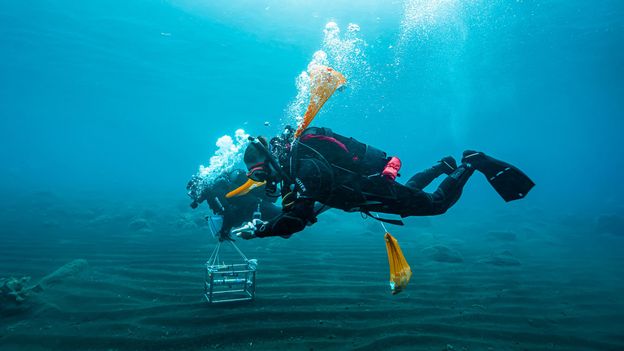Welcome to Tesla Motors Club
Discuss Tesla's Model S, Model 3, Model X, Model Y, Cybertruck, Roadster and More.
Register
Install the app
How to install the app on iOS
You can install our site as a web app on your iOS device by utilizing the Add to Home Screen feature in Safari. Please see this thread for more details on this.
Note: This feature may not be available in some browsers.
-
Want to remove ads? Register an account and login to see fewer ads, and become a Supporting Member to remove almost all ads.
You are using an out of date browser. It may not display this or other websites correctly.
You should upgrade or use an alternative browser.
You should upgrade or use an alternative browser.
Climate change
- Thread starter wipster
- Start date
EverettRuess
Member
As it is the weekend after a very successful week lets ponder the mission.
Deadline is Jan 31. "You can't take blood from a stone." Climate change and water in the Colorado River.
Deadline is Jan 31. "You can't take blood from a stone." Climate change and water in the Colorado River.
Buckminster
Well-Known Member
Buckminster
Well-Known Member
Dikkie Dik
If gets hard, use hammer
Buckminster
Well-Known Member
The brilliance of this is that it melts snow twice. The second time via CO2.
Buckminster
Well-Known Member
B
betstarship
Guest
Cross-posting here
Further - for today in the SF Bay Area:
The IPCC reported out their latest report and a survival guide yesterday. It's finally becoming obvious.
Further - for today in the SF Bay Area:
B
betstarship
Guest
Follow-up, sofas are flying off of high rises in SF:

 news.yahoo.com
news.yahoo.com

San Francisco resident spots 'flying' couch amid intense weather conditions: 'Terrified'
A TikToker user happened to be filming outside his apartment when he spotted a flying couch.
Buckminster
Well-Known Member
JRP3
Hyperactive Member
I'm sure there will be no unforeseen consequences to that ...
MC3OZ
Active Member
Gee I hope we don't end up doing that...Scientists want to dump iron nanoparticles into the oceans to save the planet
We should actively absorb CO2 from the atmosphere, but make a commercial product in a process which pays for the equipment and operation:-
- CO2 + H2 - synthetic fuels and plastics.
- Algae - food, fuel and chemical feedstocks.
- Hemp - lots of useful products.
- Bamboo - useful mainly in construction, furniture etc..
- Sugar cane - sugar can be used to make proteins via "Precision Fermentation".
Synthetic fuels and plastics will be economically viable if solar follows historic learning rates and drops to around $10/MWh for off-grid deployment,
For cleaning up soil contaminated by Fossil Fuels, there is some research showing Fungai are excellent at doing this.
Anything we do to the ocean should be definitely proven to improve the ocean, and have minimal risk We can start by removing all of the plastic, and preventing oil spills.
Last edited:
SpaceXaddict
Member
Every single dramatic graph posted to this thread has the Michael Mann Fraud in it. Mann's fraud-- as exposed in the ClimateGate scandal-- was that his software added an exponential artificial warming factor. EG: If you fed it readings where every temperature measured was exactly 70 degrees, the output would be a hockey stick graph. Even though the inputs were exactly the same.
Climate Change is a religious movement that is easy to debunk with science, but unfortunately the amount of propaganda for it is high and the understanding of science is very low.
Here's some "inconvenient truths":
1. Plants evolved for CO2 levels in the 2,000ppm range. Currently CO2 is 415ppm. If this is an unprecedentedly high level of CO2, how did plants evolve for a 4X higher level?
2. We have had an Ice Age with CO2 at over 4,000ppm. That's 10X higher. If a few ppm of CO2 (the amount caused by humans) is going to be "catastrophic" due to "CO2 induced warming", how were we able to have an ice age?
3. The IR Absorption (eg "warming effect") of CO2 is less than that of water vapor. Meanwhile water vapor is also several orders of magnitude larger than CO2 in the environment-- in fact its level changes every DAY more than all the CO2 remaining after billions of years. Yet a tiny change in CO2 is supposed to be devastating?
4. Similarly the tides are 1-4 feet minimum and up to 12 feet swings every single day, yet we are supposed to believe that islands are being devoured by at 0.1mm per year increase in ocean height? An increase that's never been measured.
Really, the whole thing doesn't add up. All of the above are easily verifiable facts, not in dispute, yet in the past 20 years I have yet to hear an explanation that doesn't involve magic.
Finally, the Scientific Method was developed to resolve these kinds of issues. It requires a falsifiable hypothesis. You can't claim "Climate Change is real" without such a hypothesis, yet nobody has one.
Propaganda, however, can be inconsistent and contradictory.
You just shouldn't fall for it.
Climate Change is a religious movement that is easy to debunk with science, but unfortunately the amount of propaganda for it is high and the understanding of science is very low.
Here's some "inconvenient truths":
1. Plants evolved for CO2 levels in the 2,000ppm range. Currently CO2 is 415ppm. If this is an unprecedentedly high level of CO2, how did plants evolve for a 4X higher level?
2. We have had an Ice Age with CO2 at over 4,000ppm. That's 10X higher. If a few ppm of CO2 (the amount caused by humans) is going to be "catastrophic" due to "CO2 induced warming", how were we able to have an ice age?
3. The IR Absorption (eg "warming effect") of CO2 is less than that of water vapor. Meanwhile water vapor is also several orders of magnitude larger than CO2 in the environment-- in fact its level changes every DAY more than all the CO2 remaining after billions of years. Yet a tiny change in CO2 is supposed to be devastating?
4. Similarly the tides are 1-4 feet minimum and up to 12 feet swings every single day, yet we are supposed to believe that islands are being devoured by at 0.1mm per year increase in ocean height? An increase that's never been measured.
Really, the whole thing doesn't add up. All of the above are easily verifiable facts, not in dispute, yet in the past 20 years I have yet to hear an explanation that doesn't involve magic.
Finally, the Scientific Method was developed to resolve these kinds of issues. It requires a falsifiable hypothesis. You can't claim "Climate Change is real" without such a hypothesis, yet nobody has one.
Propaganda, however, can be inconsistent and contradictory.
You just shouldn't fall for it.
JRP3
Hyperactive Member
We have a 500+ page thread countering all your points

 teslamotorsclub.com
teslamotorsclub.com
Climate Change / Global Warming Discussion
Actually it's not a matter of a game in my opinion. CO2 produced by ICE cars is responsible of temperature increasing in the world. As temperature increases ice at the North pole melts. As ice melts the salt concentration in the sea decreases. As the salt concentration in the sea decreases the...
Buckminster
Well-Known Member
Dump iron in the oceans.
JRP3
Hyperactive Member
You already posted about that and it seems like a bad idea. Plus we have a much more extensive existing climate thread, this one serves no purpose.Dump iron in the oceans.
Buckminster
Well-Known Member
Buckminster
Well-Known Member
Buckminster
Well-Known Member
Important enough a finding so that I'm emplacing it here. For the record, hydrothermal bacteria were a fundamental part of my geochemical (biogeochemical) graduate work.

The bacteria that can capture carbon
Could minuscule organisms help the world meet its climate goals?www.bbc.com
We have known that many, likely most, cyanobacteria are important converters of carbon dioxide. This article summarizes the hitherto unnkown ability of a certain species to perform such at an extraordinarily higher rate than others, and that it can flourish away from the sea in, for example, controlled environments in inhospitable (ie, non-arable) terrain. It could be, if not a panacea, at least playing an important role not only in controlling atmospheric CO2 levels but also in creating building blocks for plant-derived alternatives to petrochemicals, esp. "plastic" feedstocks.
Most references to the above derive ultimately from corporate press releases: I am still trying to locate lab-generated data or articles but to put a damper on the above, one needs to temper discovery from hype.
Buckminster
Well-Known Member
Microsoft are using Heirloom to sequester CO2.
They heat limestone and use the output CO2 in concrete. Remaining limestone sucks out CO2 from atmosphere. They then start again reusing the same material.
They heat limestone and use the output CO2 in concrete. Remaining limestone sucks out CO2 from atmosphere. They then start again reusing the same material.
Similar threads
- Replies
- 3
- Views
- 582
- Replies
- 5
- Views
- 3K
- Replies
- 19
- Views
- 1K
- Replies
- 42
- Views
- 4K
- Replies
- 6
- Views
- 555


